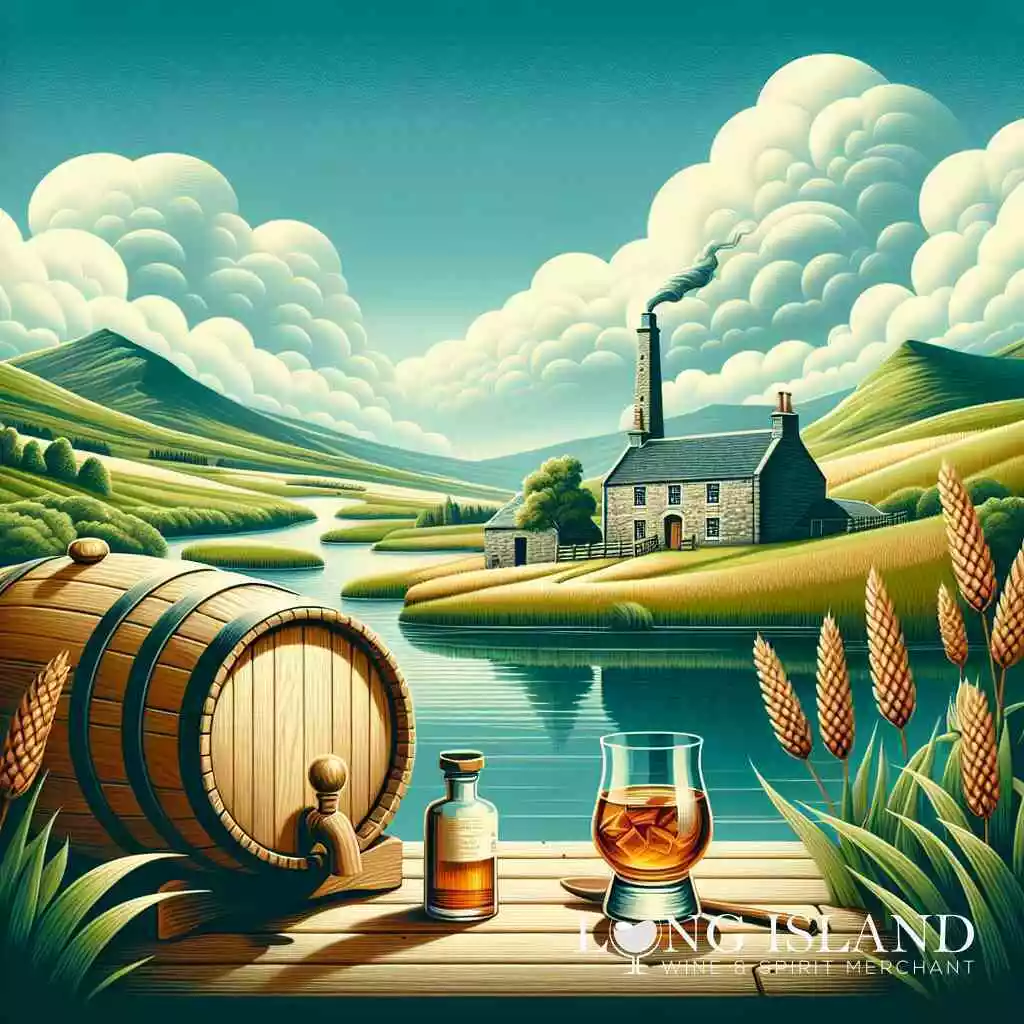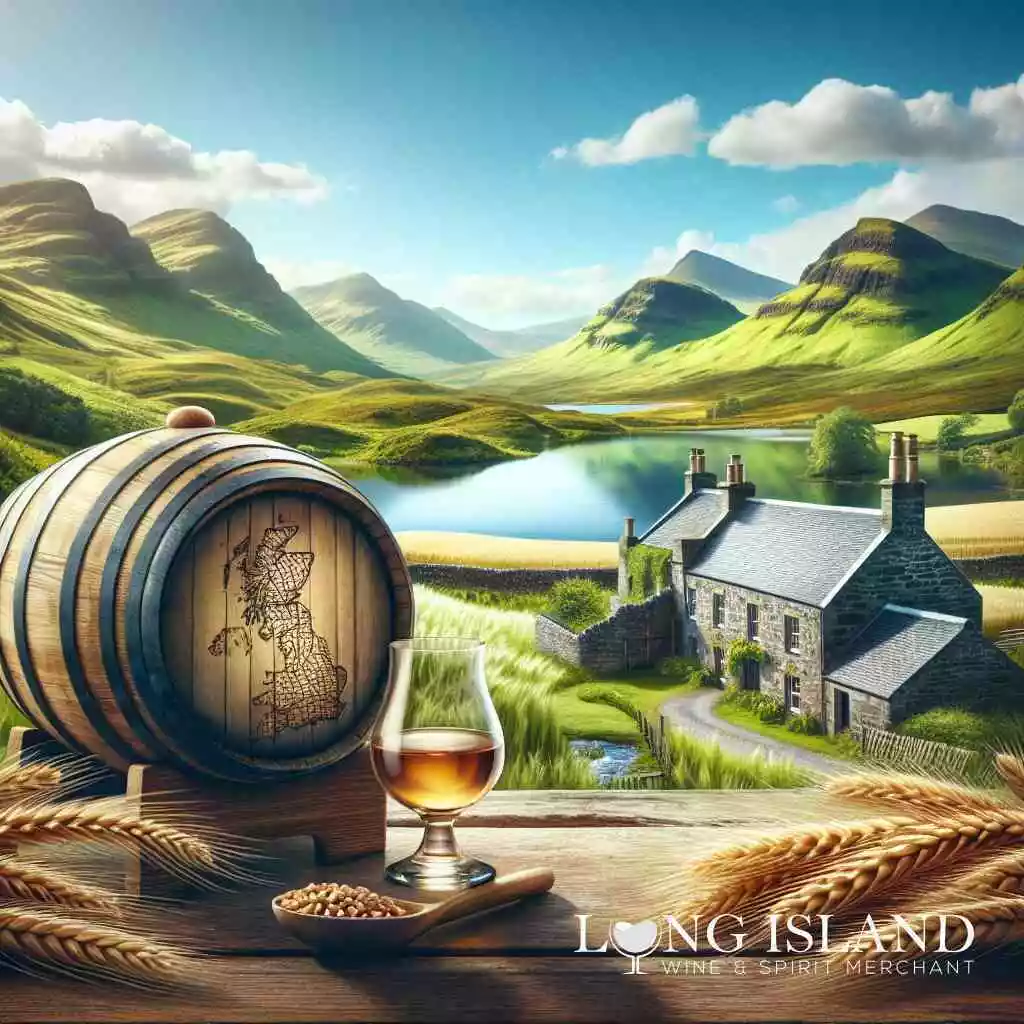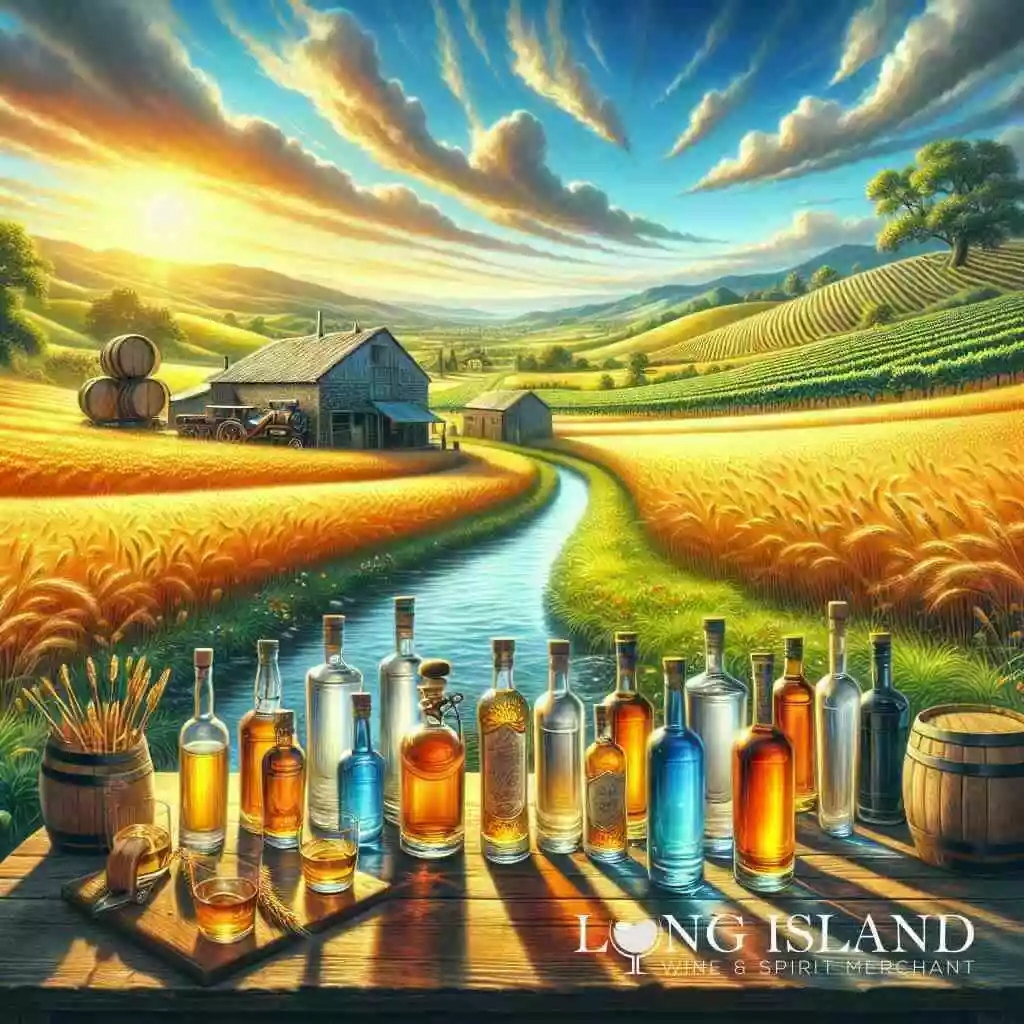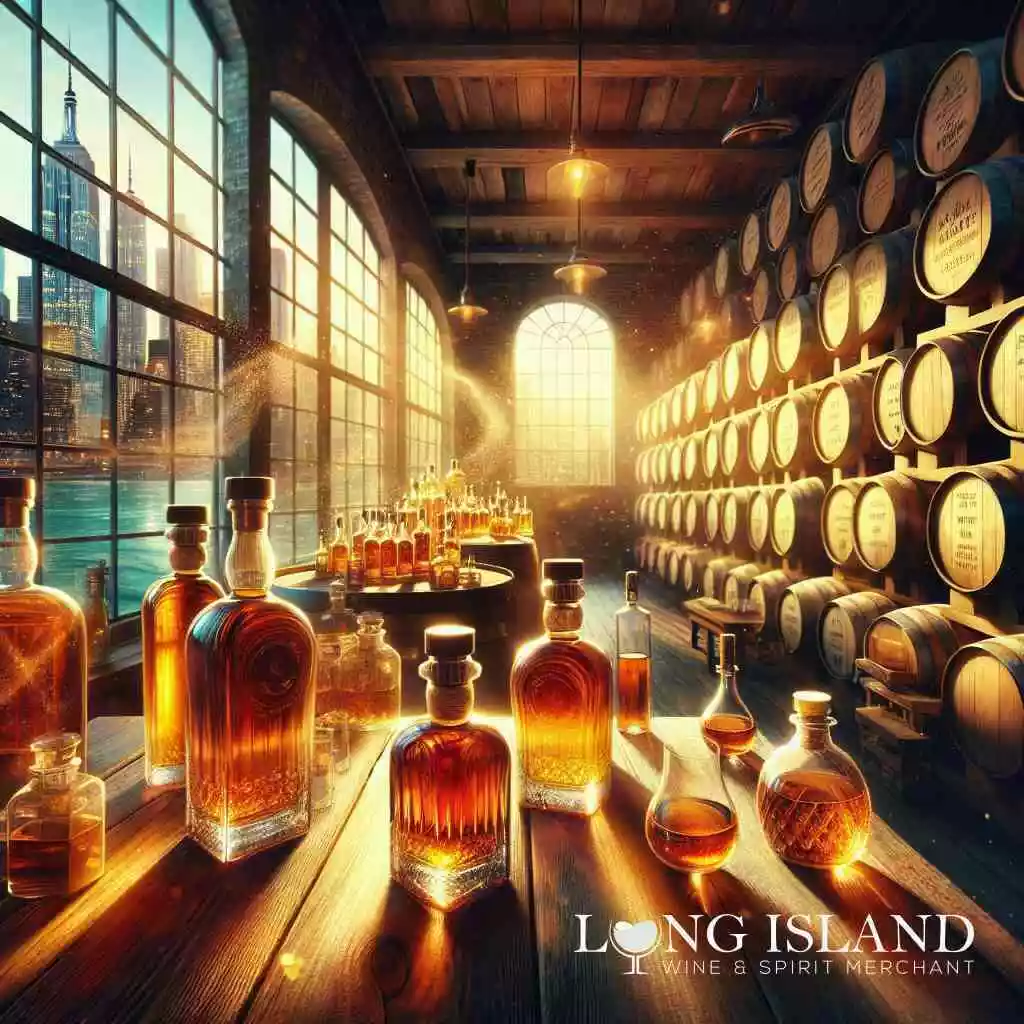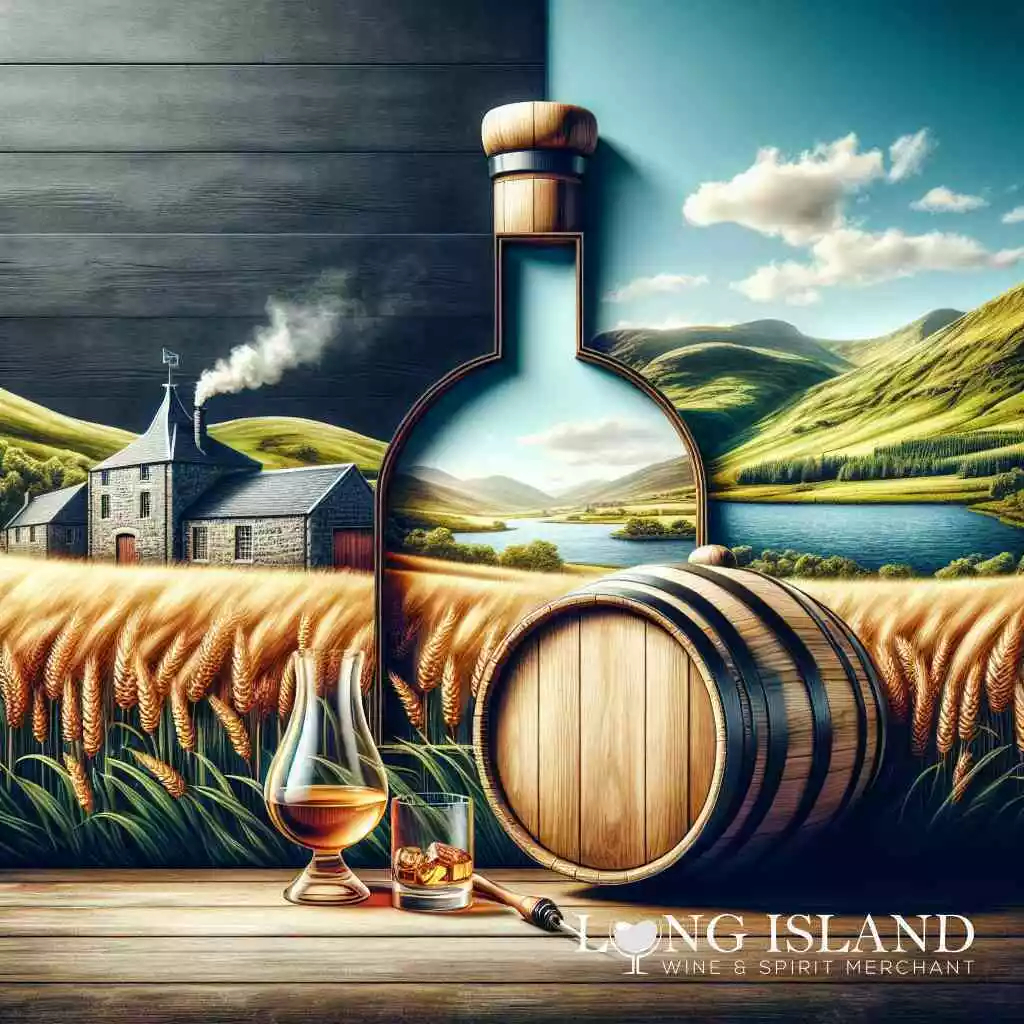
The Difference Between Scotch and Whiskey Explained
July 24, 2024
Unraveling the World of Whiskey
Introduction to Whiskey
Whiskey is a distilled alcoholic beverage that has captivated the hearts of spirit enthusiasts around the globe. Known for its rich history and diverse flavor profiles, whiskey is made from fermented grain mash, including barley, corn, rye, and wheat. The intricate production process, along with aging in wooden barrels, imbues whiskey with its unique qualities. This spirit’s versatility is evident in its various forms, ranging from smooth single malts to robust rye whiskeys. Embarking on a journey into the world of whiskey unveils a realm of craftsmanship, tradition, and sensory pleasure, offering something for every palate.
Types of Whiskey
The whiskey universe is vast, hosting a myriad of types that reflect the spirit’s geographical and procedural diversity. Major categories include Scotch whisky, known for its smoky notes; Irish whiskey, famous for its smooth and light characteristics; Bourbon, with its sweet and full-bodied flavor; and Rye, which is spicier and more robust. Furthermore, distinctions are made between single malt, single grain, blended malt, blended grain, and blended whiskey, each offering a distinct tasting experience. Understanding these categories is essential for appreciating the nuances of whiskey, as they influence taste, aroma, and complexity.
Whiskey Production Process
The whiskey production process is a fine art that transforms simple ingredients into exquisite spirits. It begins with milling the grains, which are then mixed with water and heated to release sugars. The mixture, known as mash, is cooled and fermented, turning sugars into alcohol. Distillation follows, concentrating the alcohol and removing impurities, yielding a clear spirit known as the “new make” spirit. Distillers carefully control the distillation process, as it significantly affects the whiskey’s character, concentrating on the spirit’s essence and flavor profile before it undergoes aging.
The Aging Process of Whiskey
Aging is a crucial phase in whiskey production, profoundly influencing its flavor, color, and overall profile. Whiskey is aged in barrels, typically made from oak, which contributes to its complexity, smoothness, and unique characteristics. During this time, the spirit interacts with the wood, absorbing compounds that impart aromas of vanilla, caramel, spice, and more. The aging process can vary greatly, from a few years to several decades, significantly impacting the whiskey’s quality and depth. The environment in which the barrels are stored also plays a vital role, as temperature fluctuations encourage the whiskey to expand and contract within the wood, enhancing its flavor development. Explore the Whiskey Aging Process, which is explained to help you understand how time and nature craft the soul of whiskey, resulting in the magnificent variety of spirits savored by enthusiasts worldwide.
The Unique Character of Scotch
What Makes Scotch a Scotch
Scotch, a proud emblem of Scotland, is distinguished by more than its birthplace. By law, to bear the name “Scotch,” the spirit must adhere to strict criteria. First, it must be produced at a distillery in Scotland from water and malted barley, occasionally with other grains, and must be fermented exclusively by the addition of yeast. The spirit must be distilled to an alcohol by volume (ABV) of less than 94.8% and matured in oak barrels in Scotland for no less than three years and one day. The aging process in oak barrels, essential for developing its rich flavors and golden color, occurs exclusively on Scottish soil, contributing to its unique character. Moreover, when bottled, Scotch whisky must have a minimum ABV of 40%. These rigorous regulations ensure that every bottle labeled as Scotch meets the high expectations of spirit connoisseurs worldwide, reinforcing its identity as a symbol of quality and craftsmanship.
Scotch Whisky Regions and Their Impact on Flavor
The flavor of Scotch whisky is vastly influenced by its region of origin within Scotland, each imparting a distinct character to the spirit. Scotland is home to several whisky-producing areas, including the Highlands, Lowlands, Speyside, Islay, and Campbeltown, with the Islands unofficially recognized as a separate region. Speyside, known for its sweet and fruity malts, boasts the highest concentration of distilleries, while Islay is famed for its peaty, smoky whiskies. The Highlands offers an array of flavors, from the heather-rich profiles of northern distilleries to the more robust and peaty malts of the western part. Lowland whiskies are generally lighter and milder, making them an excellent introduction for those new to Scotch. Campbeltown whiskies are known for their dryness and sometimes salty finish, reflecting the maritime influence. This diversity ensures that Scotch whisky encompasses a breadth of flavors to suit a wide range of palates, embodying the essence of the land and sea of Scotland.
Peated Scotch: Understanding the Smoky Flavor
Peated Scotch is renowned for its distinctive smoky flavor, a signature characteristic attributed to the use of peat during the malting process. Peat, a natural substance formed over thousands of years from decaying vegetation in waterlogged lands, is used to dry malted barley in a kiln, imparting the barley with its smoky aroma and flavor. This traditional method is especially prevalent in Islay and parts of the Highlands, where the abundant peat bogs have played a central role in Scotch production for centuries. The phenolic compounds in the peat smoke adhere to the barley, translating into a whisky with a pronounced smoky, earthy profile. The level of peated flavor can vary significantly, from light, subtle hints to robust and heavily smoked, offering a broad spectrum of tasting experiences for those who appreciate the smoky complexity of peated Scotch.
Single Malt vs. Blended Scotch
The distinction between single malt and blended Scotch whisky lies in their composition and crafting process. Single malt Scotch is produced from only water and malted barley at a single distillery, using pot stills. This type results in a whisky that expresses the unique characteristics and flavor profile of its distillery of origin. On the other hand, blended Scotch combines multiple single malt and grain whiskies from different distilleries, creating a harmonious blend that balances the qualities of its components. Blended Scotch can offer a more accessible, smoother, and consistent flavor profile, making it highly popular worldwide. While single malts are often celebrated for their complexity and depth, blended Scotch offers versatility and variety, catering to a diverse range of tastes and preferences among whisky drinkers. Whether one prefers the singular purity of a single malt or the intricate layers of a blend, Scotch whisky provides a rich tapestry of flavors and experiences for enthusiasts to explore.
Scotch vs. Whiskey: Understanding the Differences
Critical Distinctions Between Scotch and Whiskey
Whiskey is a sweeping term that encompasses a variety of spirits distilled from fermented grain mash, varying wildly in flavor, origin, and production process. Scotch, a revered member of the whiskey family, holds a distinguished place with its strict production standards and geographic designation. The primary distinction lies in its origin – Scotch is a whiskey that must be made in Scotland, adhering to specific guidelines that include the use of malted barley, aging in oak barrels for at least three years, and achieving an alcohol content of no less than 40%. Unlike some whiskeys, Scotch often embodies a smoky flavor, a character imparted by the peat used during the malting process. This distinction not only marks a geographical difference but also introduces unique tasting notes that set Scotch apart from other whiskey varieties. For enthusiasts searching for Scotch Whiskey Brands in store, Liquor Store Open offers a curated selection, embodying the rich heritage of Scotch.
Bourbon vs. Scotch: A Comparative Analysis
Delving into the realms of Bourbon and Scotch reveals a fascinating study in contrast, where the very essence of each spirit is influenced by its cultural and procedural heritage. Bourbon, an American whiskey primarily distilled from corn, is known for its sweet, full-bodied flavor profile, a stark contrast to the often peaty and complex character of Scotch. Another significant difference is the aging process; Bourbon barrels are new, charred oak, contributing to its unique vanilla and caramel nuances, whereas Scotch barrels can be previously used, which imparts subtler flavors and a wider taste variety. This comparison highlights not just the diversity within the whiskey world but also the specific traditions that define and distinguish each category. For a deeper insight, Liquor Store Open’s Bourbon Vs. Scotch Comparative Analysis offers a detailed exploration of these storied spirits.
Irish Whiskey and How It Stands Apart
Irish whiskey presents a unique profile in the whiskey panorama, known for its smoothness and slightly sweet, fruity notes. This distinction is partly due to the triple distillation process commonly employed in Irish whiskey production, resulting in a lighter spirit compared to its Scotch counterpart. Additionally, unlike Scotch, the use of peat is less prevalent in the production of Irish whiskey, allowing the natural flavors of the grains to shine through more prominently. These distinct production techniques contribute to Irish whiskey’s accessibility, making it an excellent entry point for those new to whiskey. With an interest in global whiskey expressions, Liquor Store Open offers enthusiasts the chance to explore various Irish Whiskey offerings, inviting a journey into its welcoming and nuanced profile.
Scotch Tasting Notes and Flavor Profiles
Scotch whisky is celebrated for its complexity and diversity, with flavor profiles ranging vastly depending on the region, distillery, and production specifics. From the peaty, smoky whiskies of Islay to the sweet, sherried malts of Speyside, Scotch offers a spectrum of sensory experiences. The water used in production, the peat’s characteristics, and the cask’s history all contribute to the final flavor, making Scotch tasting an exploration of geography and craftsmanship. Enthusiasts can embark on a sensory journey, experiencing notes from earthy and medicinal to rich and fruity. For those eager to delve into the subtleties of Scotch, Liquor Store Open guides through Scotch Tasting Notes and Flavor Profiles, offering expert recommendations and pairing ideas that highlight the spirit’s rich tapestry of tastes.
From Connoisseur to Enthusiast: Navigating the World of Scotch and Whiskey
Selecting the Right Whiskey for Your Palate
Embarking on the exploration of whiskey requires an understanding of the spectrum of flavors it offers. Selecting the proper whiskey can be akin to finding a needle in a haystack, given the vast array of choices. To navigate this diversity, start by considering the primary flavors you enjoy in your beverages. Do you prefer the rich, smoky peat of a classic Scotch, or does the sweet, mellow, corn-forward profile of a Bourbon appeal more to your taste? Understanding these preferences is critical.
Additionally, considering the occasion and the time of year, fruitier spirits might be more appealing in warmer months. At the same time, a robust Scotch can be exceptionally comforting during the colder season. For novices, blends can offer a harmonious introduction, combining multiple notes and smoothing out the sharper edges found in single malts or ryes. Remember, whiskey tasting is immensely subjective; what matters most is finding a spirit that resonates personally with you. For bespoke recommendations, taking a Wine Taste Quiz in New York can provide insights tailored to your palate, easing the selection process.
The Art of Whiskey and Scotch Tasting
Tasting whiskey and Scotch is a ritual that involves more than just the palate-it’s an experience that engages all the senses. Start by observing the color, which can offer clues about the age and cask type used in aging. Swirl the whiskey gently in your glass to release its aromas, then take a moment to inhale deeply, identifying any notes or scents that stand out. When tasting, let the whiskey coat your tongue, taking note of the initial flavors, the body, and the finish. Each whiskey has its own ‘story,’ with flavors unfolding and evolving from the moment it touches your lips to the lingering aftertaste. Scotch, in particular, can present an intricate kaleidoscope of flavors, from the smoky to the sweet, dictated by its region, distillation process, and aging. Participants can enhance their tasting skills and appreciation by joining guided tastings or whiskey education sessions. Additionally, exploring curated Cocktail Recipes can offer a different perspective on how whiskey interacts with other ingredients, potentially unveiling new ways to enjoy your favorite spirit.
Scotch and Whiskey Pairings
Pairing whiskey with food is an art that elevates both the culinary and spirit experience. The key to successful pairings lies in balance and harmony, where neither the whiskey nor the cuisine overshadows the other. Rich, peaty Scotch whiskies, for example, can beautifully complement the flavors of smoked salmon or a hearty steak, enhancing the umami notes. Lighter Scotch and whiskeys, with their delicate floral or fruity notes, pair delightfully with sushi or soft cheeses, creating a contrast that highlights the subtleties of both the drink and the dish. For a truly immersive pairing experience, consider the whiskey’s origin-Scottish whiskies may naturally accompany traditional Scottish meals, offering a sense of place and tradition. Exploration and experimentation are encouraged; sometimes, the most unexpected pairings can yield the most delightful surprises. Engaging with experts and attending pairing events can provide inspiration and guidance for those looking to refine their palate and pairing skills further.
Whiskey for the Festive Season: Recommendations from Liquor Store Open
The festive season provides a perfect backdrop to explore the warmth and complexity of whiskey and Scotch. During this time, spirits not only complement the celebratory meals but also add a touch of elegance and tradition to gatherings. For a memorable holiday experience, consider rich, aged Scotches with their deep, complex profiles, offering warmth against the chill of the season. Alternatively, a smooth Bourbon or a spicy Rye can serve as the base for festive cocktails, pleasing both connoisseurs and casual drinkers alike. For those looking to gift whiskey, personalized bottles or limited-edition releases can make for thoughtful and cherished presents. At Liquor Store Open, selections are curated with the festive season in mind, ensuring there’s a perfect bottle for every occasion, palate, and celebration. Discover our festive favorites and receive expert recommendations to make your holidays genuinely exceptional by exploring our directory of fine spirits and Alcohol Delivery Options near me, ensuring your holiday spirits are not just metaphorical but also literal and delightfully enjoyable.
Adventurous Conclusion: Embarking on Your Whiskey and Scotch Journey
Crafting Your Personal Whiskey Tasting Experience
Creating a personalized whiskey-tasting experience is akin to charting your course through a landscape rich in tradition, flavor, and history. Begin by selecting whiskies from different categories, such as mellow Irish whiskey, robust Bourbon, or the intricately layered flavors of Scotch. Consider incorporating varieties that span various regions, distillation techniques, and aging processes to appreciate the full spectrum of what whiskey has to offer. Hosting a tasting session at home can be a delightful way to share discoveries, exchange notes, and perhaps even unearth a new favorite. Tools and accessories, like proper whiskey glasses that enhance the aromatic experience, can elevate your tasting to new heights. Don’t forget to explore pairings with different foods to see how contrasts or complements in flavors can transform your whiskey tasting into an unforgettable sensory journey. For those looking to delight in the craft and science behind their favorite spirits, engaging with Wine and Spirits Engraving Services can add a personal touch to your whiskey bottles, making each sip even more special.
Exploring Whiskey and Scotch with Liquor Store Open
Liquor Store Open stands as your gateway to the expansive world of whiskey and Scotch. With an unparalleled selection of both timeless classics and intriguing new expressions, it serves as a curator for your whiskey journey. Whether you’re searching for a specific bottle to complete your collection, seeking out the latest releases, or needing advice on what to try next, Liquors Store Open offers expertise and variety. Via their Liquor Store Blog near Long Island, enthusiasts can stay informed about tasting events, new arrivals, and insights into the art of whiskey tasting. Their commitment to sourcing the finest whiskies ensures that both novices and enthusiasts will find something to treasure. For those embarking on their Scotch journey, Liquor Store Open provides not just a selection but an experience – from the moment you browse their collection to the instant you savor your chosen spirit.
Whiskey and Scotch: A Journey of Discovery
The world of whiskey and Scotch is one of perpetual discovery, where every sip is an exploration of cultures, geographies, and craftsmanship. As you delve deeper, you’ll find that your palate evolves, your preferences may shift, and you’ll develop a more nuanced appreciation for the spirit’s complexity. Engage with communities of fellow enthusiasts through tastings, forums, or social media, share your experiences, and learn from others. Embrace the journey as an ongoing adventure, where each bottle tells a story of its origins, makers, and the land itself. Remember, the exploration of whiskey and Scotch is not just about tasting different spirits but about understanding the rich tapestry of history and innovation that each glass holds. For those ready to take their passion to the next level, consider Order Alcohol Online for your Scotch Journey, ensuring you have access to a diverse selection of whiskies to explore from the comfort of your home. Whether you seek the peaty depths of a Scotch from Islay or the sweet warmth of a Kentucky Bourbon, your journey through the world of whiskey and Scotch promises to be an enriching, lifelong pursuit of taste, tradition, and transformation.
Frequently Asked Questions
Question: What types of whiskey can I find at Liquor Store Open, and do you carry single malt Scotch?
Answer: At Liquor Store Open, we offer an expansive selection of whiskeys, encompassing all significant types to cater to the diverse preferences of whiskey connoisseurs. Our collection includes single-malt Scotch, grain whiskey, blended Scotch, Bourbon, and Irish whiskey, among others. We take pride in sourcing the finest spirits from Scottish distilleries as well as renowned distilleries worldwide, ensuring that our customers have access to both timeless classics and the latest releases. Whether you’re a lover of the peaty, smoky notes of a single malt Scotch from Islay or prefer the smooth, sweet profile of a Kentucky Bourbon, we’ve got you covered. Browse our online liquor store to discover high-quality spirits and specialty drinks perfect for any occasion.
Question: Can Liquor Store Open help me understand the differences highlighted in ‘The Difference Between Scotch and Whiskey Explained?’
Answer: Absolutely! Our team at Liquor Store Open is passionate about educating our customers on the delightful world of spirits. The blog post ‘The Difference Between Scotch and Whiskey Explained’ is designed to provide a comprehensive overview of what sets Scotch apart from other types of whiskey, including production practices, geographical influences, and flavor profiles. We go beyond just selling bottles; we aim to enhance your appreciation and understanding of whiskey. With our vast resources, including detailed guides, tasting notes, and personalized recommendations via our Wine Taste Quiz, we’re here to guide you through your journey, from selecting the proper whiskey for your palate to exploring the intricate subtleties of single malt scotch and blended Scotch. Trust Liquor Store is open to a genuinely informed and rich whiskey experience.
Question: How does the whiskey aging process influence the flavor profile of Scotch, and can I find aged Scotches at Liquor Store Open?
Answer: The aging process is crucial in whiskey production as it significantly influences the spirit’s flavor, color, and overall character. Discover more about fine spirits through our detailed reviews like ‘What is Armagnac vs. Cognac: An Expert Review?‘ to understand further how aging impacts flavor profiles. Whiskey, including Scotch, matures in barrels, with oak being the most commonly used due to its ability to impart a range of flavors, such as vanilla, caramel, spice, and even fruity notes, depending on the type of oak and previous use of the barrel. The environment in which these barrels are stored also affects the maturation process, with factors like climate and humidity playing a role in the whiskey’s development. Scotch, in particular, benefits from Scotland’s unique climate, contributing to its rich and complex flavor profile. At Liquor Store Open, we offer a curated selection of aged Scotches, from those matured for a minimum of three years to luxury expressions aged for decades. Each bottle in our collection provides a glimpse into the heritage and meticulous craftsmanship behind Scotch whiskey, perfect for enthusiasts seeking depth and complexity.
Question: With the festive season approaching, what recommendations does Liquor Store Open have for Scotch and whiskey gifts?
Answer: The festive season is a beautiful opportunity to explore the warmth and complexity of Scotch and whiskey as gifts. Browse our selection and find the perfect holiday spirits in our ‘Top 10 Wines for Independence Day Celebrations‘ for gift ideas. At Liquor Store Open, we boast a curated collection of fine spirits, including limited-edition releases and personalized bottles, making for thoughtful and cherished presents. For Scotch enthusiasts, we recommend aged single malts known for their nuanced character and exceptional quality. For those who appreciate a smoother experience, a well-crafted blend might be more appealing. In addition to classic bottles, we also offer liquor bottle gift boxes and provide liquor bottle engraving services for a personal touch. Whether you’re gifting a seasoned connoisseur or a curious newcomer, our expert team is ready to help you choose the perfect bottle. Explore our alcohol delivery options to ensure your holiday spirits are both symbolic and delightfully enjoyable, making your celebrations genuinely exceptional.
Question: How can I explore new Scotch and whiskey flavors with the Liquor Store Open?
Answer: Exploring new Scotch and whiskey flavors with Liquor Store Open is an exciting and effortless journey. For more inspiration, check out our guide on ‘The Ultimate Scotch Tasting Guide in Long Island‘ to expand your palate. Start by taking our Wine Taste Quiz, explicitly crafted to understand your preferences and introduce you to spirits that match your taste. Our broad selection includes whiskeys from all the major producing regions, offering you a palette of flavors from peated Scotch whiskies to smooth Irish whiskeys and bold Bourbons. Engage with our Liquor Store Blog for the latest tasting events, new arrivals, and insights into the art of whiskey tasting. If you’re looking to dive deeper into the world of whiskey or find a new favorite, our knowledgeable staff is here to provide personalized recommendations. Whether you’re a seasoned enthusiast or a curious novice, Liquor Store Open is your trusted partner in exploring the rich and diverse world of Scotch and whiskey.
